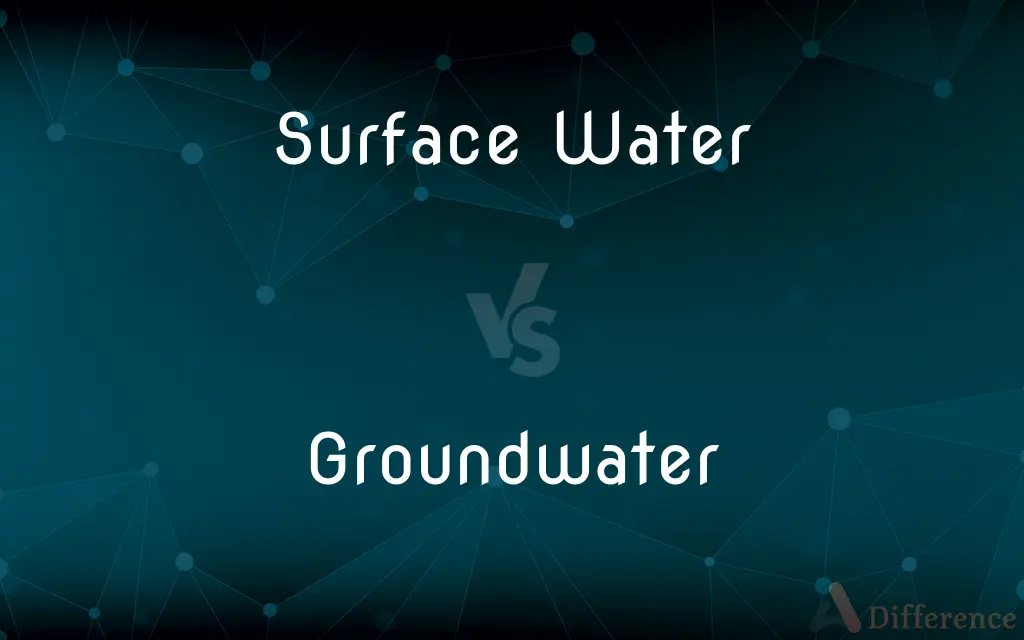Surface Water vs. Groundwater — What's the Difference?
Edited by Tayyaba Rehman — By Fiza Rafique — Published on January 4, 2024
Surface water is found on Earth's surface in features like lakes, while groundwater resides in soil or rock below ground.

Difference Between Surface Water and Groundwater
Table of Contents
ADVERTISEMENT
Key Differences
Surface water is the water that collects on the ground or in a stream, river, lake, reservoir, or ocean. It is visible and accessible directly from the earth’s surface. Groundwater, on the other hand, is water located beneath the earth's surface in soil pore spaces and in the fractures of rock formations. It is typically accessed by wells and can travel through aquifers, permeable rocks that can store and transmit water.
The quality of surface water can rapidly change due to environmental factors such as pollution, weather, and human activities. Groundwater tends to have more stable quality due to its underground location, but it can still be affected by contaminants seeping through soil and rock. Both types of water are crucial for human use, yet their vulnerabilities to pollution differ due to their exposure to the environment.
Regulation and management of surface water are often more straightforward, as it is visible and its flow can be measured and modified with infrastructure. Managing groundwater is more complex due to its hidden nature, requiring scientific analysis to understand its flow, quantity, and quality. Both resources require careful management to ensure sustainable use and availability for future generations.
Renewal rates for surface water are typically faster, influenced by the water cycle's processes such as precipitation and runoff. Groundwater recharges at a much slower pace, as it depends on water percolating through soil and rock, a process that can take years or even centuries. This difference affects how each type of water resource can be sustainably managed.
In the context of ecosystems, surface water provides habitat for a wide range of aquatic and terrestrial organisms, making it a critical component of ecological health. Groundwater also supports ecosystems, particularly in dry regions, by sustaining streams, lakes, and wetlands, especially during periods of low precipitation. Both types of water are interconnected and play vital roles in maintaining biodiversity.
ADVERTISEMENT
Comparison Chart
Location
On Earth's surface in bodies like rivers and lakes.
Beneath the Earth's surface in soil and rock.
Accessibility
Easily accessible and visible.
Accessed through wells, not visible.
Vulnerability to Pollution
More exposed, can be quickly contaminated.
Less exposed, but contamination is persistent.
Renewal Rate
Generally renews quickly via precipitation.
Recharges slowly through percolation.
Ecosystem Role
Provides habitat for aquatic and terrestrial life.
Supports ecosystems, especially in dry areas.
Management
Often simpler due to visibility.
More complex due to being hidden.
Quality Stability
Can change rapidly with environmental conditions.
Generally more stable, changes slowly.
Compare with Definitions
Surface Water
Surface water is often used for public water supplies after proper treatment.
The city’s residents depend on treated surface water for their daily needs.
Groundwater
Groundwater is less susceptible to pollution but can be depleted.
Overdrawing groundwater can lead to a drop in the water table.
Surface Water
Surface water's flow and distribution are heavily influenced by the terrain.
Mountains direct the flow of surface water into the valley’s streams and rivers.
Groundwater
Groundwater is water stored in the Earth's subsurface in aquifers.
Farmers often drill wells to access groundwater for irrigation.
Surface Water
Surface water encompasses all visible water bodies above ground.
The river is an important source of surface water for the nearby towns.
Groundwater
Groundwater supplies are crucial for sustaining agriculture in arid regions.
The oasis is sustained by groundwater even during the driest seasons.
Surface Water
Surface water is subject to direct pollution from atmospheric and land sources.
Industrial runoff has severely polluted the surface water in the lake.
Groundwater
Groundwater often emerges naturally at springs or can be extracted via wells.
A spring at the hill’s base provides fresh groundwater to the village.
Surface Water
Surface water is essential for many ecosystems and human uses.
Wetlands are rich in biodiversity thanks to the abundant surface water.
Groundwater
Groundwater's movement is generally slower than surface water.
Groundwater might take years to travel between aquifers.
Groundwater
Water beneath the earth's surface, often between saturated soil and rock, that supplies wells and springs.
Groundwater
Water that exists beneath the earth's surface in underground streams and aquifers.
Common Curiosities
What is the primary source of surface water?
Surface water primarily comes from precipitation, including rain and snowmelt.
What are the typical uses of surface water?
Surface water is commonly used for drinking water, agriculture, and industry after treatment.
How does groundwater form?
Groundwater forms from precipitation that soaks into the ground and accumulates in aquifers.
Can surface water contribute to groundwater?
Yes, surface water can percolate through the soil to recharge groundwater supplies.
How do humans access groundwater?
Humans access groundwater by drilling wells or utilizing springs.
What's a significant difference in managing surface water versus groundwater?
Surface water is easier to manage due to its visibility and quicker renewal, while groundwater management requires careful assessment of unseen aquifers.
Can groundwater levels affect surface water?
Yes, declining groundwater levels can reduce the flow of springs and streams, affecting surface water bodies.
Is groundwater always clean?
Groundwater is typically cleaner than surface water, but it can be contaminated by substances that seep into the ground.
Why is surface water more prone to contamination?
Surface water is more exposed to pollutants from the air and land, making it more vulnerable to contamination.
Are surface water and groundwater connected?
Yes, they are part of the same hydrologic cycle and can exchange water between them.
How do urban areas impact surface water and groundwater?
Urbanization can lead to pollution and overuse of surface water, and impervious surfaces can reduce groundwater recharge.
What affects the quality of surface water and groundwater?
Both can be affected by natural processes and human activities, but surface water quality changes more rapidly.
Why is groundwater less likely to be affected by short-term pollution events than surface water?
Groundwater is protected by the overlying soil and rock which can filter out contaminants before they reach the aquifer.
Is it possible to run out of groundwater?
Yes, if groundwater is extracted at a rate faster than it is replenished, it can be depleted.
How does climate change impact surface water and groundwater?
Climate change can alter precipitation patterns, affecting both surface water availability and groundwater recharge rates.
Share Your Discovery

Previous Comparison
ADSL vs. Cable Modem
Next Comparison
Migrant vs. ImmigrantAuthor Spotlight
Written by
Fiza RafiqueFiza Rafique is a skilled content writer at AskDifference.com, where she meticulously refines and enhances written pieces. Drawing from her vast editorial expertise, Fiza ensures clarity, accuracy, and precision in every article. Passionate about language, she continually seeks to elevate the quality of content for readers worldwide.
Edited by
Tayyaba RehmanTayyaba Rehman is a distinguished writer, currently serving as a primary contributor to askdifference.com. As a researcher in semantics and etymology, Tayyaba's passion for the complexity of languages and their distinctions has found a perfect home on the platform. Tayyaba delves into the intricacies of language, distinguishing between commonly confused words and phrases, thereby providing clarity for readers worldwide.
















































